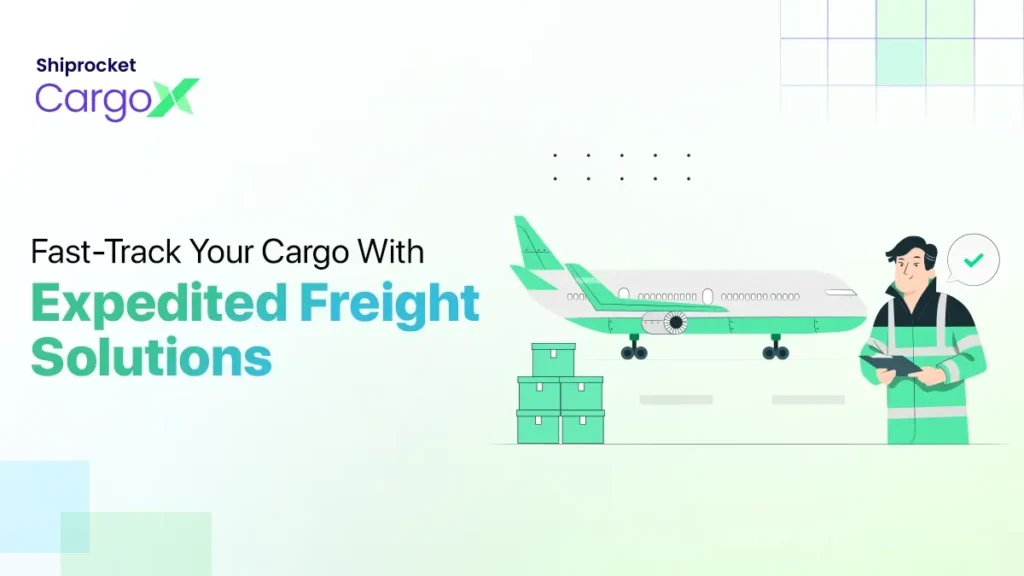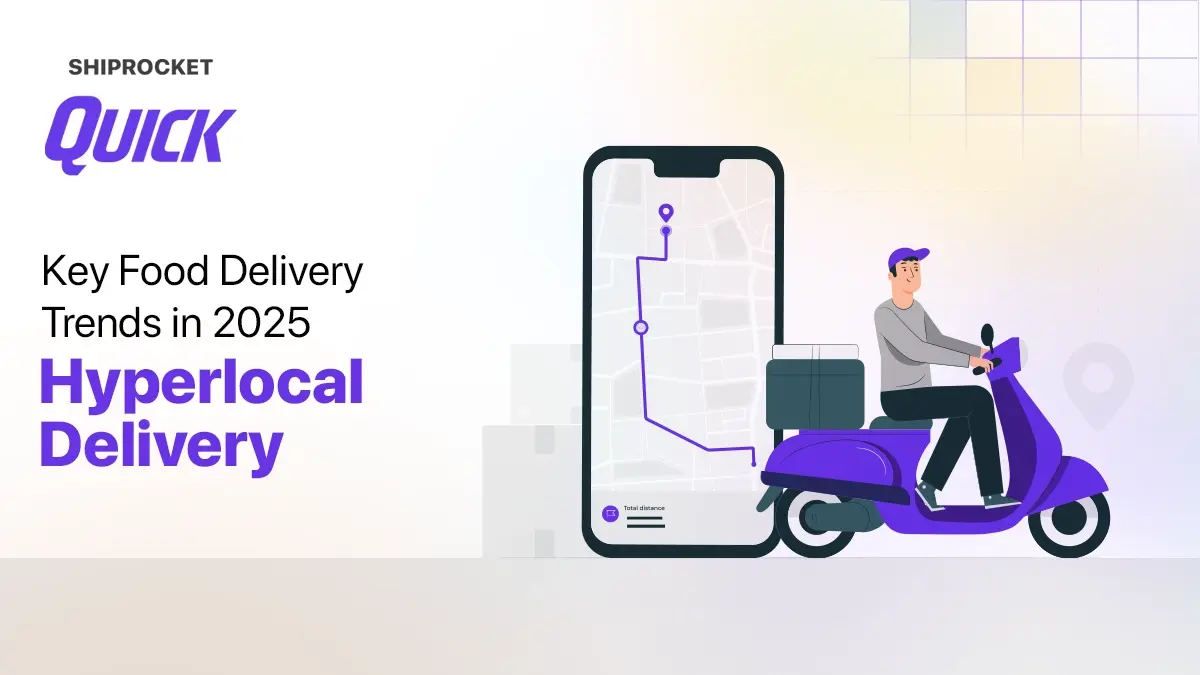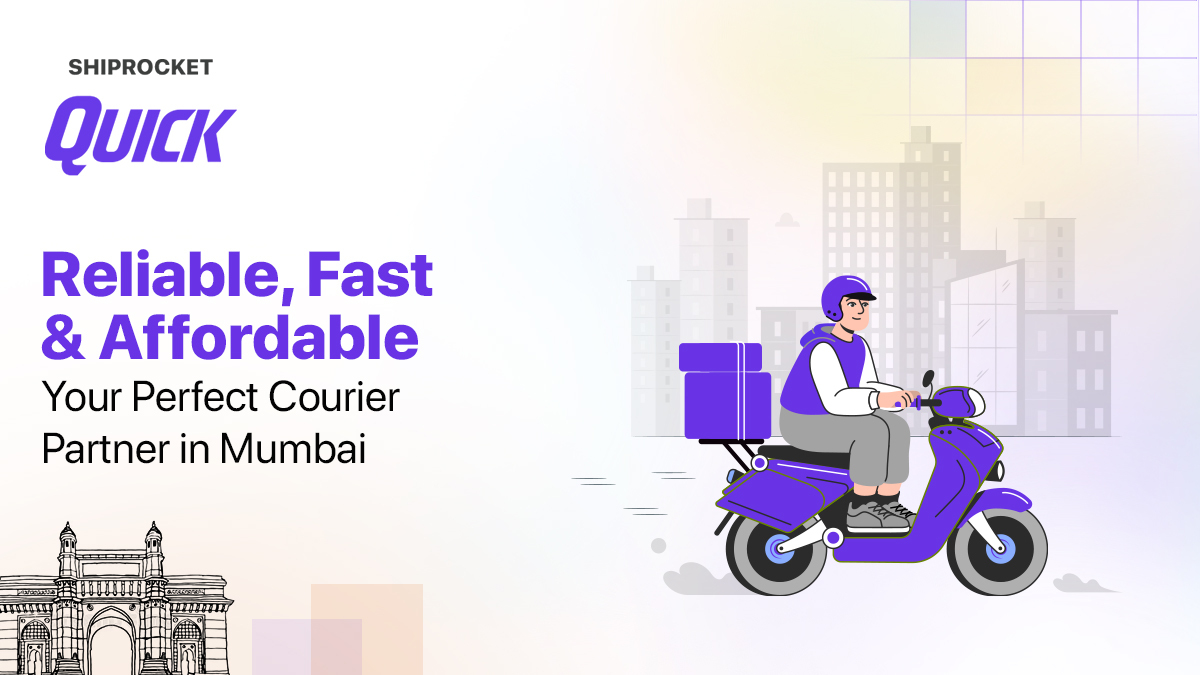Expedited Freight Shipping: Types, Benefits, Challenges
- Types of Expedited Freight Shipping
- Benefits of Expedited Shipping
- When Should Shippers Consider Expedited Freight Services?
- Minimising Unnecessary Use of Expedited Shipping
- Factors Influencing the Cost of Expedited Freight
- Challenges in Accessing Expedited Freight Services
- Expedited Freight Shipping Across Borders
- Minimising Risks and Delays
- Conclusion
eCommerce shipping is constantly pushing businesses to meet increasingly demanding delivery schedules. Getting freight to land at your consignee’s doorstep before it’s too late compels you to push the boundaries of standard freight services. In such situations, where you need the freight to reach quickly, expedited freight helps you stretch your limits. Expedited freight shipping is not just a luxury solution to meet tight delivery schedules but a necessity to stay competitive in the industry.
But what is expedited freight, and how does it help? Well! It’s a service that charges a premium to deliver goods at a faster speed than standard shipping options and drastically cuts down transit times. You may have some urgent shipments, high-value cargo, or time-sensitive deliveries to make. Expedited freight helps you get through such time-bound deliveries in no time, maintaining the safety and perfect condition of the goods.
This article will shine a light on the deeper aspects of expedited freight and highlight its part in improving the speed and efficiency of supply chains for greater customer satisfaction.

Types of Expedited Freight Shipping
The different types of expedited freight shipping are discussed below:
1. Sprinter Vans
Sprinter vans are the agilest option in the expedited freight arsenal. They’re ideal for small, time-sensitive shipments that need to be moved quickly over land. These vans are specifically suitable for direct deliveries of high-value goods, documents, or parts that are necessary for preventing operational downtime in industries like manufacturing or technology. The compact size of Sprinter vans provides a bunch of benefits: they make loading and unloading faster, allow nimble navigation through urban areas, and help avoid the delays that usually occur when you use larger freight vehicles. Businesses opt for Sprinter vans for transporting shipments that require a mix of speed, security, and efficiency.
2. Straight Trucks
Straight trucks, often called box trucks, offer a middle-ground transport solution in terms of size and capacity for expedited freight. They’re larger than Sprinter vans but are more manoeuvrable and faster than the traditional semi-trucks. They comprise enclosed cargo areas that protect goods from any external elements due to exposure and also from potential theft. This feature makes straight trucks an excellent choice for transporting larger shipments that need expedited delivery. Businesses mostly use straight trucks for delivering goods directly to customers (D2C) or other businesses (B2B). Putting straight trucks to use bypasses the need for additional handling and warehousing, which helps reduce your transit times and any potential delays.
3. Air Freight
When time is your top priority, and your shipment needs to travel long distances or overseas quickly, air freight is the fastest shipping option available. Air freight is capable of moving goods across continents and oceans in a matter of hours. It may take days or weeks by land or sea to accomplish the same task, making these modes unfit for international expedited freight. Air freight is indispensable for high-value, perishable goods or urgent shipments that cannot afford the delay of ground transportation. This mode of transportation may be costlier than others, but offers an unmatched speed of delivery and global reach for critical shipments.
Benefits of Expedited Shipping
Expedited shipping offers unmatched advantages to businesses that prioritise speed and reliability in their logistics operations. Here are a few key benefits:
Assured Delivery Times
One of the most amazing advantages of using expedited shipping is the guarantee of delivery times. This predictability in delivery times is an invaluable asset for businesses that operate on tight schedules and have no scope to afford any delays. Assured delivery times mean that companies can plan their supply chain activities with a high degree of confidence. They are aware of exactly when their goods will arrive with these fixed timetables. The dependability feature of expedited shipping helps businesses maintain seamless operations. Having the operations sorted means companies can avoid costly downtimes and meet strict deadlines, which is very important for time-sensitive products.
Faster Transit Speeds
Expedited shipping is literally another word for speed. By opting for expedited services, businesses can massively reduce the transit time of their shipments. They achieve this speed through direct routes, fewer stops, and the use of premium transportation modes like air freight or dedicated ground services with team drivers capable of covering extremely long distances quickly. Faster transit speeds of expedited shipping are highly suitable and generally preferred for delivering perishable goods, high-value or luxury items, or any time-sensitive cargo. It allows companies to swiftly respond to market demands, replenish stocks in time, and provide an exceptional customer experience by making timely deliveries.
When Should Shippers Consider Expedited Freight Services?
Businesses can consider choosing expedited shipping in the following circumstances:
Addressing Supply Chain Issues
When you encounter unexpected supply chain disruptions, like production delays, inventory shortages, or sudden surges in demand, expedited shipping comes to your rescue. It allows firms to quickly adapt to changes and deflect any potential impacts on their supply chain operations. As businesses cut down the transit times, they’re able to replenish stocks faster, meet customer demands punctually, and maintain a smooth flow in their supply chain.
Retaining Product Value
If you’re shipping perishable goods, pharmaceuticals, or any products with a limited shelf life, then using expedited freight services will surely pay off. These services ensure that such time-sensitive or temperature-sensitive items reach their destination before their value diminishes. Speed is an important factor for this type of shipment to preserve product quality, efficacy, and safety. It ultimately shields the reputation of your business and the trust your customer vests in you.
Avoiding Equipment Downtime
In industries where businesses rely on machinery and equipment, downtime may lead to major financial losses. Most importantly, such businesses need expedited freight services for delivering spare parts and necessary components quickly to prevent or reduce any possible disruptions in their operations. This proactive response on the part of businesses saves them from bearing exorbitant costs associated with halted production lines or service delays.
Protecting High-Value Shipments
High-value or luxury items, because they’re exorbitantly expensive or of high strategic importance, often require the added security and speed that expedited freight services provide. This speedy service reduces the delivery time for these valuable items and guards them against potential risks during transit. It brings peace of mind to both shippers and recipients.
Nurturing Supplier Relationships
Timely delivery is a key modern-day need for businesses to sustain solid relationships with their suppliers and partners. They can nurture such partnerships by increasing the reliability and efficiency of expedited freight services, which help them foster trust and satisfaction. These services can specifically play a crucial part in delivering critical components required for production purposes or fulfilling obligations to customers. It makes all the parties involved in the supply chain feel that they can rely on each other.
Minimising Unnecessary Use of Expedited Shipping
More often than not, the responsibility of making timely deliveries falls on the shoulders of the transportation department. This may force them to use expedited freight services to fulfill this duty, especially when upstream activities or inaccuracies leave them with no other choice.
Improving forecasting and gaining better insight into both current and incoming inventory levels can help you diminish the use of expedited freight services. Moreover, assigning internal accountability for the expenses associated with expedited shipping leads to using such services more judiciously.
Everyone is excited to expedite shipments until the burden of additional costs falls over them. This diverts our attention to the importance of transparency and responsibility in managing logistics costs. It also encourages a more strategic approach to shipping and inventory management in a business.
Factors Influencing the Cost of Expedited Freight
Factors influencing the cost of expedited freight are:
- Weight: Expedited freight often uses air transport for part of its journey, where the dimensional weight becomes crucial. This measurement evaluates the volume of the package in contrast to its actual weight. Then, airlines charge customers based on whichever of these values is greater, between the package’s weight and the space it occupies.
- Delivery time: The delivery deadlines majorly influence the cost. So, the deliveries that are relatively more urgent incur a higher fee.
- Distance: The distance from the shipment’s origin to its destination also affects the cost of expedited freight. Longer distances generally invite higher costs.
This sheds light on the fragile balance between speed, space, and cost in expedited freight logistics.
Challenges in Accessing Expedited Freight Services
There are a few hurdles you may need to jump through when using expedited freight services. You may face relatively higher costs than standard shipping, limited availability in peak or holiday seasons, and strict requirements for regulating cargo. The high quality you get with expedited freight services comes at a premium price. This premium or added cost can strain your budget, especially if you run a small or medium-sized business.
During high-demand periods, like holidays or industry-specific peak times, it becomes increasingly difficult for businesses to get their hands on expedited shipping options. This can lead to delays in delivery. Moreover, you need well-thought-out preparation to keep up with the strict criteria for shipments, like the size and weight restrictions and packaging standards. These factors collectively call for careful consideration and strategic planning by businesses willing to use expedited freight services for their urgent shipping needs.
Expedited Freight Shipping Across Borders
Cross-border expedited deliveries require coordination and cooperative efforts from multiple stakeholders. For instance, think of a shipment travelling from the borders of Canada to the United States. This shipment process will need coordination among the original sender in Canada, a logistics company, a transport provider, a customs agent, possibly other border services, the transporter on the U.S. side, and sometimes even a representative from the receiving company. These parties need to collaborate to make a successful delivery.
Effective communication is a very integral and crucial requirement for standard deliveries. So, Imagine! How flawless must be the communication for an expedited freight delivery?
Moreover, reducing the chances of delay is also vital for expedited freight deliveries. For example, the moment your goods are ready for dispatch, a vehicle needs to be on standby, regardless of the time or day. The customs agent must also prepare and precisely complete all entry and customs documentation for a seamless handover. Needless to say, this kind of operation runs 24/7.
Minimising Risks and Delays
Effective communication and knowing the deadline beforehand are extremely crucial in reducing the risk and delays in shipping. This critical information helps streamline the process by minimising unnecessary exchanges and choosing a perfectly efficient shipping route.
Opting for an expedited freight due service, considering cost alone, may not be a great idea. If you pick a relatively cheaper option, it may leave you in the middle of bewildering complications. For instance, getting a low quote might mean that the provider still does not have a driver in place. The provider failing to find one in time can cause severe delays in your delivery.
It’s also way more important to confirm or reconfirm the delivery address for urgent orders as compared to regular orders. This is because standard delivery orders may have the flexibility to adjust the address shortly after placing an order, but rush orders have a narrow window to such immediate amendments. Trying to change an address after the shipment has been dispatched to a private courier can complicate the expedited freight shipping process.
Conclusion
In this fast-reeling global market, expedited freight services are a big-time necessity for businesses to make timely deliveries and sustain customer satisfaction. These expedited freight services make dealing with urgent shipments, protecting valuable cargo, and following tight schedules a breeze. Expedited freight, which consists of options such as sprinter vans, straight trucks, and air freight, is a significant component in time-sensitive logistics. However, using such services requires careful consideration on behalf of the companies. They must evaluate their supply chain strategies to alleviate the reliance on expedited freight options. Businesses need to focus on improving their inventory management and communication to make this possible. Moreover, analysing and willfully comprehending the costs and challenges of expedited freight helps companies make decisions that enhance efficiency and meet the demands of a gushing market.
However, you can avail of these advantages only if you choose a trusted international logistics service provider like CargoX. Shiprocket’s CargoX ensures shipping brilliance. With its widespread network, spread across over 100 overseas regions, it enables the transportation of goods to different parts of the world in a quick and hassle-free manner.
When you’re scrutinising expedited freight service providers to hire the best one, don’t forget to check if they use advanced tracking and communication technologies. These high-end, advanced technologies give you real-time visibility and updates on shipments. You should find service providers who have a solid network to offer you various shipping options for meeting the specific requirements of your business. They must also offer reliability and speed and have the ability to handle your urgent or sensitive shipments. Moreover, you need to assess their experience in the industry, quality of customer service, and flexibility to adapt to unexpected or unpredictable changes.
Shippers can plan things to get rid of last-minute expedited needs, which will negate or reduce expedited shipping costs. Another flexible way is consolidating shipments when feasible and fully utilising the cargo space to cut down on the exaggerated per-unit costs. Additionally, creating strong relationships with providers allows shippers to negotiate better rates and decipher the cost-benefit analysis of expedited vs. standard shipping for every situation. They can also choose to employ state-of-the-art technology to optimise shipping routes and use efficient packaging to minimise their dimensional weight charges.
You can begin by figuring out the critical shipments that directly affect your revenue or customer satisfaction. Use expedited freight options to ship high-value products or to abstain from running into stockouts of fast-moving or high-demand items. Moreover, you can work to accommodate expedited freight in your overall supply chain strategy, which comprises inventory management and predictive analytics to gauge and minimise potential delays. This approach is bound to help you seize the opportunity to use expedited freight judiciously, and in return enhance your customer service without unnecessarily inflating costs.






